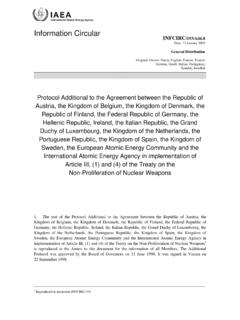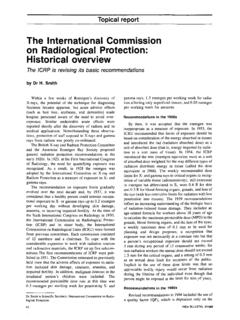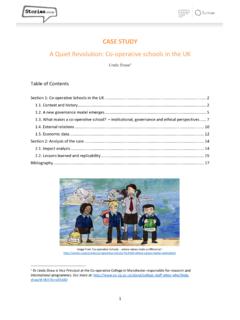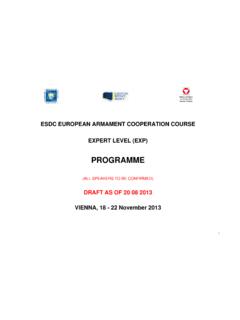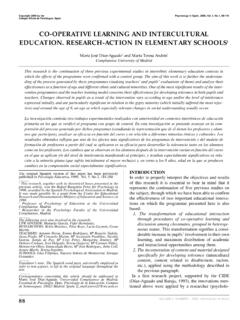Transcription of The Regional Co-operative Agreement for Research ...
1 The Regional Co-operative Agreement for Research , development and Training Related to Nuclear Science and Technology by Eugene Fowler History The International Atomic Energy Agency's effort to encourage and assist Member States in Research , development and application of atomic energy for peaceful uses includes furthering Regional co-operation among them to enable efficient use of available resources. The feasibility of creating a framework for promoting Regional Co-operative projects was the object of meetings convened by the IAEA at Manila, Philippines, in March 1969 and at Bangkok, Thailand, in July 1970. Based upon the recommendations of the meetings and subsequent consultations carried out by the Director General with interested Governments in South Asia, South East Asia, and the Far East, a Regional Co-operative Agreement for Research , development and Training Related to Nuclear Science and Technology was formulated under the auspices of the IAEA in 1971 for acceptance by Member States.
2 The Agreement , known as the RCA1, entered into force on 12 June 1972 for a period of five years. The following Member States acceded to it Bangladesh, India, Indonesia, Republic of Korea, Malaysia, Pakistan, Philippines, Singapore, Sri Lanka, Thailand and the Socialist Republic of Viet Nam In June 1977, the IAEA extended the Agreement for an additional five years from 12 June 1977 To date the following Member States are parties to the Agreement as extended: Australia, India, Indonesia, Malaysia, Pakistan, Philippines, Singapore, and Thailand The Government of Japan has indicated its intent of acceding to the Agreement . The purpose of the Agreement is to promote and co-ordinate reseaich, development and training projects in nuclear science and technology through co-operation between the appropriate national institutions and with the IAEA's assistance 1. Reproduced in document INFCIRC/167. Mr Fowler is Head of the Industrial Applications and Chemistry Section and has been co-ordinating RCA.
3 Matters since joining the Agency in January 1975. 18 IAEA BULLETIN-VOL 20, Operation of the Agreement Any Member State in the area of South Asia, South East Asia, the Pacific and the Far East may become a party to the Agreement . Any party may initiate a Co-operative project by means of a written proposal to the IAEA If at least two parties are interested in participating in such a project, the interested Governments and the IAEA will initiate negotiations with a view to establishing the project. Given the consent of the parties to an established project, any other State may also participate in the project. The IAEA's support for such projects is provided through technical assistance and other programmes in accordance with the IAEA's established procedures. The progress and co-ordination of Co-operative programmes and projects are reviewed at annual meetings of the parties to the Agreement , held in conjunction with the regular sessions of the General Conference of the IAEA.
4 Proposals for establishing new Co-operative projects are also considered at such meetings Progress and Achievements During the early period of the RCA, the concentration was on organizational and administrative matters associated with the implementation of the Agreement . All Co-operative projects have been established since 1975. In view of the needs of Member States during the 1972 77 period, highest priority has been given to training of personnel, medical use of radioisotopes, and food and agriculture. The current RCA Co-operative projects cover a broad spectrum of technologies and interests, among which are food and agriculture, medicine, environmental Research , industrial applications, training, Research reactor use including radioisotope production, and physical Research such as nuclear data programmes. The first Regional project under the RCA was initiated in 1975. It related to Research on the use of ionizing radiation for the preservation of fish and fishery products The main objective of the project is to co-ordinate studies on the application of nuclear techniques for the preservation of fish and fishery products, thereby improving the protein supply available to developing Member countries in the region.
5 Individual studies under the project are aimed primarily at the development of radiation dismfestation of sun dried and smoked fish, prolongation of shelf life and storage, and selection of suitable packaging materials. Low doses of radiation coupled with ice handling can double or triple the market life of seafood which would otherwise spoil rapidly unless frozen Moreover, blanched, semi-cooked and cooked seafood sealed in polyethylene bags can be stored at room temperature for long periods after radiaton treatment. Six Member States participated in this project: Bangladesh, India, Indonesia, Pakistan, Philippines and Thailand. Another Regional Co-operative Research project involves the improvement of gram legume production in South East Asia using nuclear techniques. RCA countries now co-operating in this work include. Bangladesh, India, Indonesia, Republic of Korea, Pakistan and Sri Lanka; The main objective of the project is to provide sufficient quantity and quality of an important protein and calorie source to the people of South East Asia.
6 These crops are nutritionally an essential supplement to cereals and have the advantage that their production may proceed with little or no nitrogen fertilizer, since with proper soil and crop management the plants are capable of fixing much, if not all, of their nitrogen requirements through microbial action. IAEA BULLETIN-VOL 20, 19. Table 1: Projects established or recommended under the RCA, that is, the Regional Co-operative Agreement for Research , development and Training Related to Nuclear Science and Technology. Project Date Countries Participating Estimated Initiated 1978 costs Research on the use of ionizing 1975 Bangladesh, India, . radiation for the preservation of Indonesia, Pakistan, fish and fishery products Philippines, Thailand Improving grain legume 1978 Bangladesh, India, $25,000. production in South East Asia Indonesia, Rep. of Korea, using nuclear techniques Pakistan, Sri Lanka Improving domestic buffalo 1978 Malaysia, Pakistan, $25,000. production using nuclear Thailand, India, techniques Indonesia, Sri Lanka Some other countries are expected to join.
7 Health related environmental 1978 India, Indonesia, $20,000. Research using nuclear techniques Pakistan, Philippines, (This aims at identifying groups Thailand, or individuals with high levels of Republic of Korea trace element contaminants and correlating this to environmental pollution). Research directed to material 1978 The IAEA is $30,000. science problems (bearing in mind collaborating with India, the importance of the neutron Republic of Korea and scattering phenomena) Thailand Technical assistance for industrial 1978 Australia, India, $98,000. isotopes and radiation applications Indonesia, Rep. of Korea, Malaysia, Pakistan, Philippines, Singapore, Sri Lanka, Thailand Projects which have been approved but which are unfunded The use of low energy accelerators for analytic studies Initiation Training and safety related to expected in the use of Research reactors. 1979. The preparation and control of 99m Tcand113mlninradio- pharmaceuticals. 20 IAEA BULLETIN - VOL 20, To date, grain legume production has suffered the drawbacks of low and often unstable yields.
8 The objective of the proposed scheme is to carry out a co-ordinated Research programme into both the agronomy and breeding aspects of increasing the gram productivity in the South East Asian region. This Research programme would include nuclear techniques to enable more rapid progress in these countries. A seminar on "The use of induced mutations in the improvement of grain legume production in South-East Asia" was held in Sri Lanka in December 1975 by the IAEA The agronomic and breeding problems associated with the improvement of grain legume production were discussed at this seminar. A new Regional project was initiated in 1978 for improving domestic buffalo production using nuclear techniques. This is of importance to countries where buffaloes play a significant role in agriculture. The aim of the Research programme is to improve production potential in general, through the solution of nutritional, reproductive and other problems The benefits of this Research are increased production of milk, meat, draught power and leather.
9 Six RCA Member States have already indicated that they are co-operating in Research in this area. India, Indonesia, Malaysia, Pakistan, Sri Lanka, and Thailand. Some others are expected to join this Co-operative programme A project on health related environmental Research using nuclear techniques has also been started The purpose of the project is to conduct Co-operative Research to reveal groups or even individuals with elevated levels of trace element contaminants and to correlate the trace element content in humans to environmental pollution in various regions of Asia and the Pacific region. Different nuclear techniques will be applied using both reactors and accelerators The Member States participating in this project are India, Indonesia, Pakistan, Philippines, Thailand and Republic of Korea. Recognizing the importance of the neutron scattering phenomena to applied problems, the IAEA, in collaboration with three RCA Member States, India, Republic of Korea and Thailand, is carrying out Co-operative Research directed to material science problems.
10 This work promises to be of value to metallurgical development and to the chemical industry. At the Meeting of Representatives of the Governments party to the RCA held in conjunction with the General Conference in Rio de Janeiro in 1976, it was recognized that over the next five-year period of the RCA (1977 1982) " Regional co-operation must be directed more toward solving industrial problems of countries in the region, as these will assume primary importance toward the end of the century.". In 1977 the Board of Governors approved a request for a Regional technical assistance project for industrial isotopes and radiation applications The project was implemented in April 1978. This is the first Regional technical assistance project funded from the IAEA's own resources in the 20 years of its activities The project was established to help meet the requirements of Governments and industries in Asia and the Far East in industrial development and in the use of modern radioisotope techniques to bring about economic and social benefits.



